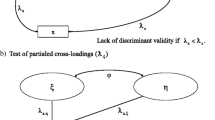Abstract.
This is a review of recent results on the disaggregation problem: given a collective demand function, is it or is it not the sum of individual demand functions, and, if it is, can one retrieve the individual demands from their given sum? There are several variants to this problem, depending on whether one deals with market demand or excess demand, but the general philosophy remains the same: to get interesting answers, i.e. to be able to discriminate between those collective demand functions which arise from individual utility maximization and those which do not, one needs microeconomic data (e. g., the individual allowances).
Similar content being viewed by others
Author information
Authors and Affiliations
Additional information
Received: 15 November 1999 / Accepted: 3 February 2000
Rights and permissions
About this article
Cite this article
Ekeland, I. Testable consequences of economic theoryRID=""ID=""This is the written version of a conference delivered at the University of Calabria for the 1999 meeting of AMASES. The author is grateful to AMASES for their invitation.. DEF 23, 1–13 (2000). https://doi.org/10.1007/s102030050002
Issue Date:
DOI: https://doi.org/10.1007/s102030050002




